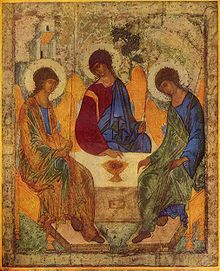Michael Fallon MSC began his talk on the second day of our Marist retreat suggesting prayer is sharing in Jesus' communion with the Father. This experience, says Therese of Lisieux, gives energy: 'For me, prayer is a surge of the heart ... it is a cry of recognition and of love'. Theilhard de Chardin, in 1934, saw prayer this way: 'Some day, after harnessing space, the winds, the tides and gravitation, we shall harness for God the energies of love. And then, for the scond time in the history of the world, we shall have discovered fire'. In offering us his Spirit, Jesus is offering us Himself, and so a share in His own communiion with God, and His prayer.
Such sharing within the Holy Trinity is depicted by this icon which was painted by Russian Andrey Rublev in the fifteenth century. It depicts the Trinity - Jesus in the centre, the Father on the left and the Spirit on the right. The Spirit is looking at the Eucharist. As there are four sides at a table, there is a place for each of us at the front - each of us can be the fourth person.
Michael went on to remind us of times when Jesus prayed: 1. Before daylight in a lonely place after healing many people the day before (Mark 1:35); 2. As He wept over Jerusalem (Luke 19:41) because the people did not realise Jesus had come to save them; 3. With Peter and the two sons of Zebedee in the Garden of Gethsemane, as He searched for meaning, not knowing what tomorrow would bring (Jesus' humanity) and saying 'My Father ... Your will be done' (Matthew 26: 36-46) and on Calvary feeling God had abandoned him (Mark 15:34, Luke 23:34-36, John 19:26-30).
Today, through the gift of the Spirit who transforms us (2 Cor 3:18) we are invited to pray with St Paul 'so that it is no longer I who live, but it is Christ who lives in me (Gal 2:20).
Michael concluded his presentation with seven principles of prayer: 1. The best prayer is the prayer which God is offering. We don't initiate prayer, we respond. To turn towards God is to alreay be in prayer. 2. We must constantly remind ourselves that God is offering us the intimacy of his communion. 3. The value or quality of our prayer is measured by the fruit which it produces in our lives: our obedience, our humility, our gentleness and especially our love. 4. Whatever happens, Teresa of Avila tells us 'we must not abandon prayer' (Interior Castle 11.1.10). 5. 'There is no stage of prayer so sublime that it is not necessary often to return to the beginning' (Teresa of Avila). 6. It is important to follow the advice of Teresa and 'set our eyes on Christ' and 7. If we are serious about prayer, we must be resolute about turning away from sin which 'blocks out the light'.
John McMahon

